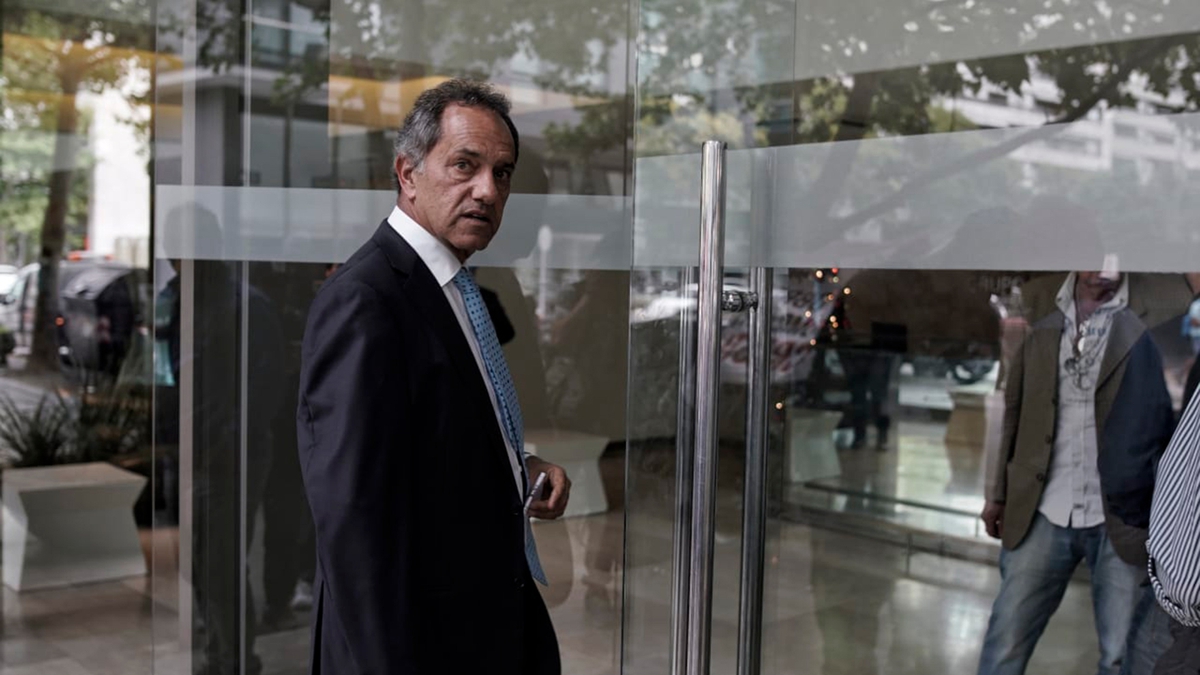RIO DE JANEIRO, BRAZIL – On January 13th, a stuffy Wednesday of a less rainy summer than usual in Brasília, Argentine Ambassador Daniel Scioli climbed to the third floor of the Planalto Palace for an audience with Admiral Flávio Rocha, Strategic Affairs Secretary of the Jair Bolsonaro government, in which he voiced concern about the opening of the Brazilian wheat market to suppliers from outside MERCOSUR.

Rocha insistently touched his cell phone. After a few minutes, the Admiral interrupted the conversation and got up. He asked Scioli to join him. Less than ten meters away, he opened the door to the presidential office.
“Happy birthday, my friend,” said Bolsonaro, who made a point of making room in his schedule to congratulate him on the date. Scioli left the Planalto with three gifts: a bottle (now consumed) of cachaça, the pledge that Brazil will not reduce its wheat purchases from the neighboring country and the signal that Bolsonaro will finally meet Argentine president Alberto Fernández in Foz do Iguazu on March 26th, to celebrate the 30th anniversary of MERCOSUR.
Known as a moderate Peronist and conciliator with no previous experience in the diplomatic world, Scioli achieved in six months as an ambassador what seemed impossible when he landed in Brasília amid a full pandemic: to relax Brazil-Argentina relations and pacify the Bolsonaro family, who attacked the progressive Fernández as part of “that little group of the [leftist] São Paulo Forum”.
As a result, he ultimately offered “a lesson in diplomacy and pragmatism to the Rio Branco Institute [Brazil’s State Department],” as stated by a Ministry of Foreign Affairs official who is a critic of the current administration.
It is fitting to recall the state of relations before Scioli’s arrival. Bolsonaro said that Rio Grande do Sul would be a “new Roraima” because of Argentine refugees fleeing from economic chaos. Foreign Minister Ernesto Araújo described Fernández’s victory as the triumph of the “forces of evil”. The two heads of state had never spoken. Moreover, Deputy Eduardo Bolsonaro (PSL-SP) retweeted a message with two pictures side by side: himself holding a rifle and Estanislao, the son of the Argentine president who cosplays and is a drag queen, dressed as the character Pikachu, from the “Pokémon” anime.
“The mood has changed completely,” said Scioli, without concealing his sense of contentment. Ten days after his visit to the Planalto, Flávio Rocha – one of Bolsonaro’s main foreign policy advisors – flew to Buenos Aires. He met with several ministers and had dinner with Fernández in Olivos, the Argentine presidents’ official residence.
On his return, the Ambassador opened his house on the shores of Lake Paranoá and welcomed Eduardo Bolsonaro for a “roast” and wine. All in the utmost cordiality. “Sunday lunch with the family”, posted the President’s #3 son on social networks, thanking Gisela Berger, Scioli’s wife, and Francesca, his three-year-old daughter, for the hospitality.
Amid the multiple malaise fronts created by Brazil abroad, stretching from China to Germany, from Emmanuel Macron to Joe Biden, the latest gestures of appeasement with Argentina had little repercussion here. However, the visibility on the other side of the border is much greater. Perhaps because Brazil is the market receiving most Argentine exports, because there are not as many ideological enemies in the world, or simply because the presence of the former presidential candidate in one of the most important embassies in the country draws the attention of local media.
Given such exposure, it is not strange to ask: could Scioli repeat his candidacy of six years ago, when he lost to Mauricio Macri in the second round of the presidential election, and attempt the Casa Rosada again? For Bolsonaro’s aides, who have not exactly been successful in their electoral projections in other countries, this is what Néstor Kirchner’s ex-vice (2003-2007) and former governor of the Province of Buenos Aires (2007-2015) dreams of. “He doesn’t even conceal this desire,” says an advisor with a cabinet in the Planalto.
For Argentine political scientist Marcos Novaro, a researcher at CONICET (one of the main scientific research institutes in the country), this is a remote prospect. Although it is almost a consensus that Fernández will not seek reelection, Novaro sees Scioli’s case more as a political rescue. He recalls that his image, after the failed race for the Casa Rosada, became very worn out and he dwindled within Peronism. Macrism succeeded in spreading harsh criticism of his performance on issues such as education, infrastructure and security in Greater Buenos Aires.
Then Alberto Fernández emerged, valuing Peronists in a more balanced style. “His is an administration composed of political survivors, but now a progressive advance of hard kirchnerism over the government is underway,” notes the political scientist. “Scioli gives the president what he needs: photos, for domestic consumption, in order to say that they are managing to normalize the relationship with Bolsonaro’s Brazil. And that’s how he strives to be featured in the Argentine news. He may eventually replace the current Foreign Minister [Felipe Solá], who is weakened, but I don’t think he dreams of returning to electoral politics.”
Asked about his pretensions for 2023, Scioli assures that he is fully focused on his activities as Ambassador and “nothing more”. His work rate is indeed intense. Since his arrival, he has visited nine states and met with virtually all Ministers. Only Paulo Guedes (Economy), Ricardo Salles (Environment) and Damares Alves (Women, Family and Human Rights) are left. He took a liking for pineapple, drinks up to four cans of guaraná [soft drink] a day, loves soccer. He doesn’t even think about embracing a second team in Brazil. He supports Boca Juniors wherever he is and summarizes: “Las pasiones no cambian” (Passions never change).
Source: Valor

